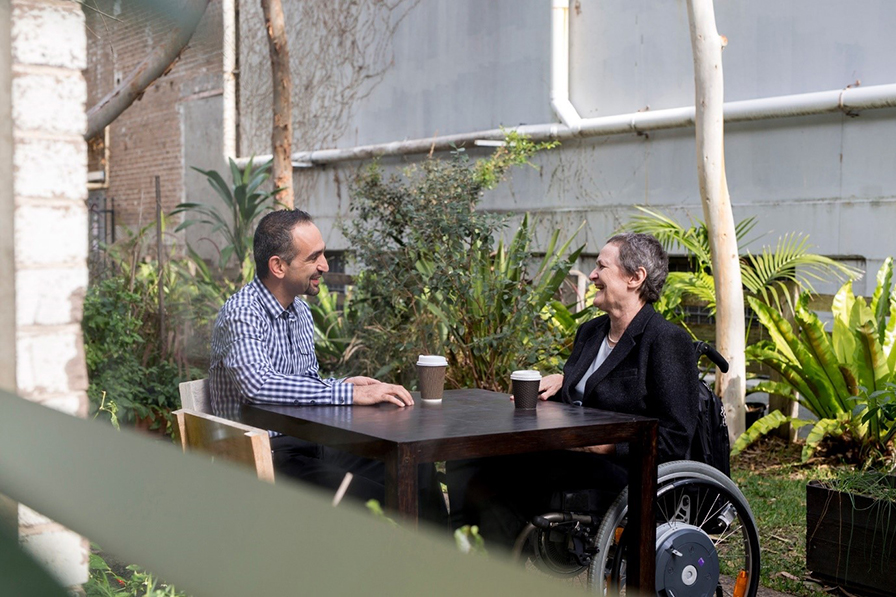How a JobAccess Professional adviser supports employers to remove barriers

Image: Man and woman sitting at table (Source: JobAccess)
Expert support, innovative solutions, and clear and consistent communication – that is what you can expect when engaging with a JobAccess Professional Adviser regarding workplace modifications, support and training to remove barriers to disability employment.
JobAccess Professional Advisers are fully qualified, health professionals who can talk with people with disability, employers and service providers about managing disability in the workplace and provide tailored suggestions. This includes coordinating with the National Panel of Assessors to conduct free workplace assessments, and advising on workplace modifications and support which may be eligible for reimbursement through the Employment Assistance Fund (EAF).
Assistance is free of charge and provided via a dedicated call centre (1800 464 800) and comprehensive website. Callers can speak directly with a range of health professionals, including psychologists and occupational therapists, from anywhere in Australia. EAF guidelines and applications are available online.
Melinda Fisher is one of the JobAccess Professional Advisers, with a background in occupational therapy.
“For me, the most satisfying part of this role is to see the changes that both small and large modifications can make for an individual who has been trying to cope without help for a long time. To know that these changes will mean the person can complete their tasks with confidence and independence, improve their productivity and ability to manage physically gives a lot of satisfaction to me,” shared Melinda.
“To be part of a process that enables a worker living with disability to be more comfortable and to participate in meaningful employment and feel a more productive member of a team is very rewarding.’’
The JobAccess team has years of accumulated knowledge about the best ways to remove workplace barriers for people with disability, ensuring the right modifications and adjustments are made quickly and efficiently to allow people to get on with their job. These can be small or large, involve new assistive technologies or simple changes to work routines, and even include awareness training and AUSLAN interpreting to support workmates.
In the course of a recent day for Melinda, she managed a number of new enquiries, with initial discussions to determine the barriers involved. She also progressed existing applications; reviewed reports from assessors, approved recommendations and provided updates to the parties involved including employers, employees with disability and service providers. Just some of the modifications that crossed Melinda’s desk included:
- a visual alert on a dishwasher
- a cooling headband, vest and wristband to assist with managing Multiple Sclerosis at work
- a ZoomText keyboard, large monitor and webcam to address low vision
- ramps and modified storage shelves to remove barriers for wheelchair users
- funding for AUSLAN interpreting to participate in a job interview.
How employers can make an application to the Employment Assistance Fund
Employers can submit an online application at www.jobaccess.gov.au.
JobAccess will assess the application and let your organisation know the outcome. If the application is successful, JobAccess will also advise if a workplace assessment is required.
If a workplace assessment is not required, your organisation can purchase the modifications or adjustments, and have the costs reimbursed by JobAccess.
If a workplace assessment is needed, JobAccess will arrange a specialist (at no cost to you) to assess what workplace changes may be required. The assessor will visit and look at your workplace, identify any barriers that may exist, and talk with you and the employee to find solutions to make the workplace more accessible and flexible.
Your organisation can then purchase the modifications and have the costs reimbursed by JobAccess.
Seeing first-hand the positive impact that workplace modifications can make for an employee with disability, Melinda shared this helpful advice for employers.
“When employing a person with disability, or, when an existing employee with disability shares difficulties they may be encountering in their role, we encourage you to provide reassurance and offer support to address any workplace barriers. You can also advise that JobAccess may be able to assist overcome the difficulties they are experiencing, and that the process is easy to navigate and managed by experienced health professionals,” explained Melinda.
“If an employer lodges the application on behalf of the individual, it’s helpful for them to have a clear understanding of the tasks that the employee is experiencing difficulty in completing, prior to discussing with the Professional Adviser, as this assists to progress the application.
“Essential documentation is also required once the application is lodged. This includes medical evidence to confirm the disability, confirmation that the worker was born in Australia or is a permanent Australian Resident and that they are working in an ongoing role for a minimum of eight hours per week,” said Melinda.
The final piece of advice for employers is that they don’t have to do this on their own – JobAccess is here to help remove barriers to disability employment, and help foster inclusive and accessible workplaces. It’s all in a day’s work for a JobAccess Professional Adviser.
You can contact a JobAccess Adviser on 1800 464 800 for more information about the EAF and assistance with submitting an EAF application.
Last updated:
